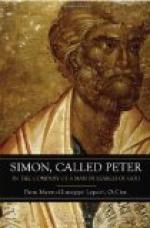The movement of chairs and the gathering of a bigger congregation than usual near a chapel that Peter perceived to be for the dead aroused him. He got up to go. He walked quickly up Victoria Street, and marvelled over the scene he had left. In sight of Big Ben he glanced up—twenty to nine! He had been, then, an hour and a half in the cathedral. He recalled having read that a Mass took half an hour, and he began to reckon how many persons had heard Mass even while he had been there. Not less than five hundred at every half-hour, and most probably more. Fifteen hundred to two thousand souls, of every sort and kind, then, had been drawn in to that all but silent ceremony, to that showing of Jesus crucified. A multitude—and what compassion!
Thus he walked home, thinking of many things, but the vision he had seen was uppermost and would not be displaced. It was still in his eyes as he entered their bedroom and found Julie looking at a magazine as she lay in bed, smoking a cigarette.
“Lor’, Peter, are you back? I suppose I ought to be up, but I was so sleepy. What’s the time? Why, what’s the matter? Where have you been?”
Peter did not go over to her at once as she had expected. It was not that he felt he could not, or anything like that, but simply that he was only thinking of her in a secondary way. He walked to the dressing-table and lifted the flowers she had worn the night before and put there in a little glass.
“Where have you been, old Solomon?” demanded Julie again.
“Seeing wonders, Julie,” said Peter, looking dreamily at the blossoms.
“No? Really? What? Do tell me. If it was anything I might have seen, you were a beast not to come back for me, d’you hear?”
Peter turned and stared at her, but she knew as he looked that he hardly saw her. Her tone changed, and she made a little movement with her hand, “Tell me, Peter,” she said again.
“I’ve seen,” said Peter slowly, “a bigger thing than I thought the world could hold, I’ve seen something so wonderful, Julie, that it hurt—oh, more than I can say. I’ve seen Love, Julie.”
She could not help it. It was a foolish thing to say just then, she knew, but it came out. “Oh, Peter,” she said, “did you have to leave me to see that?”
“Leave you?” he questioned, and for a moment so lost in his thought was he that he did not understand what she meant. Then it dawned on him, and he smiled. He did not see as he stood there, the clumsy Peter, how the two were related. So he smiled, and he came over to her, and took her hand, and sat on the bed, his eyes still full of light. “Oh, you’ve nothing to do with it,” he said. “It’s far bigger than you or I, Julie. Our love is like a candle held up to the sun beside it. Our love wants something, doesn’t it? It burns, it—it intoxicates, Julie. But this love waits, waits, do you understand? It asks nothing; it gives, it suffices all. Year after year it just waits, Julie, waits for anyone, waits for everyone. And you can spurn it, spit on it, crucify it, and it is still there when you—need, Julie.” And Peter leaned forward, and buried his face in her little hand.




